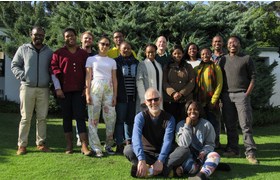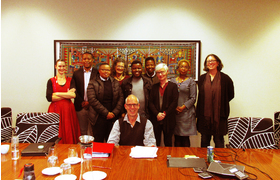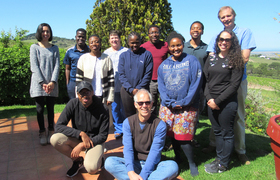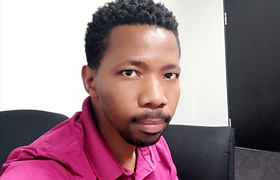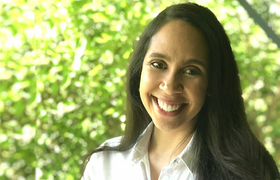Colin Francois du Sart: New nGAP member
29 April 2020 | Story Colin du Sart. Photo Supplied. Read time 5 min.
Colin du Sart joined the Department of Mechanical Engineering as an nGAP Phase 5 lecturer in January 2020. He is a University of Cape Town (UCT) graduate who obtained his master’s in engineering with distinction. Prior to coming to UCT, Du Sart had a spell in the private sector working as an engineering consultant in the mining industry.
His first response to his appointment was that he had struck gold.
“This is surely the best career opportunity that has come my way, and I intend to make the absolute most of it!”
Du Sart is the youngest of seven siblings and grew up in Atlantis before his family relocated to Table View, and subsequently Milnerton. In his junior years he attended Woodbridge Primary and Milnerton High.
“These are not the most renowned schools, but if it weren’t for the people I interacted with [there], the cultures I was exposed to, and the values that were instilled in me during these years, then I probably wouldn’t be where I am today,” he said.
Academic journey
He was always a top achiever academically and had dreams of becoming a lawyer or an accountant. However, on the day applications were due for submission (literally the last day), he had his dad drive him to UCT to change his first choice to a BSc in mechanical engineering. His dad was not impressed.
“I couldn’t blame him. I had no idea what I was getting myself into. Physics was my weak point and my marks were average at best, but I had my reasons and so I rolled the dice. In hindsight, I think I made the right call that day.”
Five years later he received his BSc.
“It was a bumpy ride with lots of highs and lows. I failed physics in first-year (who would have thought), but was top of the class the following year,” he said. “My father’s businesses succumbed to the global financial crises, but I managed to secure multiple scholarships. I had to make many sacrifices, but in the end I was the first in my immediate family to obtain a degree, and that made it all worth it.”
“I was the first in my immediate family to obtain a degree, and that made it all worth it.”
Du Sart then completed an MSc in mechanical engineering, which he received with distinction. He believes that he developed the most during this time – professionally and personally. He also said that he began to love research and development during this time, and that he would have completed a PhD immediately after graduating. However, his father passed away in his final year of studies, so he made the financially driven decision to find employment.
Joining nGAP
He joined Paterson & Cooke Consulting Engineers (PCCE) in January 2017. “Great job, great people, great company,” Du Sart said. While at PCCE, he also completed a BCom honours in financial analysis and portfolio management, which he received with distinction.
After three years of working in the private sector, his feet began to itch.
“I needed something new, something exciting, something more challenging. I was considering a move to PCCE’s office in Perth, and so I was seconded there to test the waters. However, before I even made my decision to relocate or not, I saw an nGAP advert and I couldn’t help but think it was God’s way of telling me to stay. I applied and the rest is history, as they say.”
Du Sart’s primary research interest is in thermofluid systems modelling, particularly related to solar and gas power generation, and pneumatic and hydraulic transportation. He is also interested in developing financial portfolio optimisation models. His long-term goal is to become a renowned specialist in these areas of practice, to leverage this to succeed, and to use this success to help others.
“If I can achieve anything close to this, I will die a happy man.”
Until then, he said “a good espresso, anything Manchester United, a game of golf, and my fiancée (who I will marry in October) keep a smile on my face”.
 This work is licensed under a Creative Commons Attribution-NoDerivatives 4.0 International License.
This work is licensed under a Creative Commons Attribution-NoDerivatives 4.0 International License.
Please view the republishing articles page for more information.
New Generation of Academics Programme (nGAP)
UCT has responded energetically to the New Generation of Academics Programme (nGAP), an opportunity provided by the Department of Higher Education (DHET) to build a new generation of black South African academics. The DHET’s 2015 vision document, “Staffing South Africa’s Universities Framework: A comprehensive, transformative approach to developing future generations of academics and building staff capacity”, proposes a suite of initiatives to address the challenge, with nGAP being the major instrument to increase the numbers of black South African academics.
The programme “involves the recruitment of highly capable scholars as new academics, against carefully designed and balanced equity considerations and in light of the disciplinary areas of greatest need”. The nGAP scholars are appointed into permanent positions where from the outset their conditions are customised to ensure their successful induction into the ranks of established academics.
The DHET provides funding over a six-year period to support the appointment of an nGAP lecturer, and their time is protected to provide the best possible opportunity for the completion of a doctorate degree in the shortest possible time. Once the degree is completed, the nGAP lecturer’s teaching commitments are steadily increased until they shoulder a full teaching load.
Since the first advertisement for nGAP posts in 2015, UCT has been awarded 17 nGAP positions: 5 (Phase 1), 4 (Phase 2), 3 (Phase 3) and 5 (Phase 4). These are distributed across all faculties.
UCT’s nGAP scholars operate as a single cohort, managed and coordinated by Dr Robert Morrell. Lecturers meet for quarterly meetings, writing retreats and various capacity-building activities all designed to support the completion of postgraduate qualifications (particularly doctorates) and to develop records of achievement that will testify to their emergence as self-standing, excellent academics. Each lecturer is mentored by a senior scholar, who provides support and guidance on the challenges that routinely face academics.
The nGAP manager sets great store in building the cohesion of the cohort and encouraging the establishment of new UCT networks while producing a collaborative, mutually supportive and embracing work culture.
According to Dr Morrell, “This group of academics will lead UCT in 15 to 20 years’ time ... Their vision of excellence, of being African and South African, of serving a wider community and producing knowledge for the planet, the continent and the country, will power UCT in years to come.”
Newsletters
In the news




